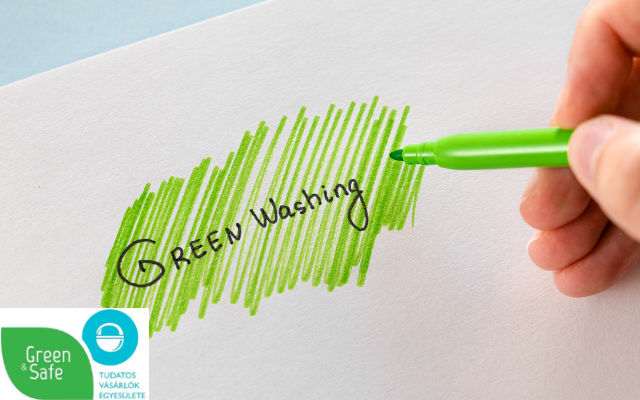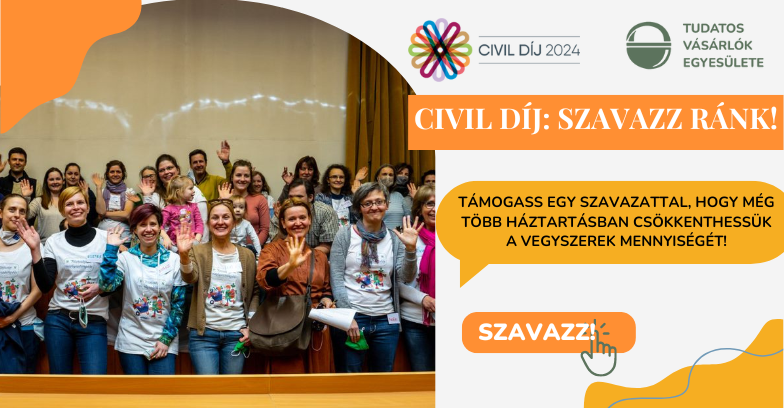
WARNING! This is greenwashing: When the corporate marketing department makes the world “sustainable” with slogans and colors
Association of Conscious Consumers is launching a campaign to raise awareness and help consumers see clearly in a world of “green, natural, sustainable, eco, carbon neutral” and similar, often misleading claims. Companies too have recognized the importance of sustainability and the demand for it. Behind the nice slogans and green images, however, we do not see any real content supported by verified actions and measurements. With our communication campaign as well as with a challenge, we would like to call attention to this phenomenon. Also, we expand the Conscious Consumer Application with eco-labeled products, boosting a change in consumer habits.
Association of Conscious Consumers has been working for twenty years so that consumers can live a sustainable lifestyle, and their demand for sustainable products and services would force market players to change as well. 85 percent of retailers report an increase in the turnover of “green” products. One of the reasons for this is that consumers have been anxious about the deteriorating state of their environment, so they have been looking for such products.
Companies have been well aware that green messages have a positive effect on the recognition and turnover of their products. However, products aimed at conscious consumers often only seemingly serve environmental purposes, as there are no significant efforts or changes behind the good-sounding claims – or there are minimal efforts while a maximum of green marketing. These deceptive or false messages are collectively called greenwashing.
In the European Union and in Hungary, about half of the claims referring to environmentally friendly properties were found in surveys to be misleading in a way that violates the law, exhausting the concept of unfair commercial practice.
According to last year’s survey of the Conscious Consumers, within the cleaning products market only 1.7 (!) percent of eco products holds an authentic eco-label certificate. It is common practice among cleaning products that they are not certified by a third party or that the claim itself is too vague or misleading. Confusion in customers’ minds is exacerbated by the fact that there are approximately 500 eco-labels of different quality and strength on the global market, and consumers spend an average of just 7 seconds (!) to decide on a product while shopping. Therefore, the European Commission has been considering new regulations that would prohibit the use of unprovable, vague and misleading environmental claims. According to the Conscious Consumers, one of the main barriers to behavioral change towards sustainable consumption is the information chaos surrounding sustainable solutions. It is quite clear from the figures and numbers above that a sustainable lifestyle will not be promoted by more information, but by more accurate, properly validated information.
We consider greenwashing harmful and risky because:
- Misleading green claims may lead consumers to wrong decisions while they believe they are making the right decisions.
- It normalizes our current level of consumption, which is not sustainable. Products and services that have been on the market for a few years in their current form suddenly appear as green. Consumers easily believe that everything is fine, that there is no need to fundamentally change their habits – even though this is inevitable.
- It distracts our attention from the need for social dialogue and consensus aiming at reduced consumption. It prevents the launch of programs and real solutions aimed at this dialogue and consensus, since it seems that “there is an easier way”, moreover, it is so self-evident, since it is everywhere.
- It’s also bad for those businesses that have invested in truly green operations and the development of environmentally friendly products, because the benefits are skimmed off by bogus businesses making empty claims, thereby gaining an unfair competitive advantage. And good businesses are at a disadvantage compared to scammers.
- Greenwashing hinders the spread of truly green innovations, because it’s difficult to notice and find them in the noise of green communication. In addition, consumers can easily satisfy their sustainable lifestyle aspirations with the easy solutions at hand. They will not look any further. This also reduces the motivation to innovate for businesses that are striving for real environmental benefits.
- Consumer trust in environmentally friendly products with authentic certification is damaged: it is also to the detriment of those certification systems that prove real results and show validated claims, such as the EU Eco-label and its equivalents in member states.
- And of course it’s bad for the planet too.
Now, let us give you a good example: EcoLabel is 30 years old!
The EU Ecolabel and its country-specific equivalents, such as the German Blauer Angel or the Scandinavian Nordic Ecolabel (Swan) certification can be awarded to those products, whose adverse environmental effects are significantly smaller than those products serving a similar purpose.
The criteria for obtaining the EU Ecolabel are determined by the EU and the member states in cooperation with the industry, civil organizations dealing with environmental protection and consumer organizations, and are reviewed every four years to see if the given product still meets the expectations.
One of the advantages of the EU Ecolabel is that the criteria take the whole product life cycle into account – including but not limited to production, packaging and waste management. Fitness-for-use criteria are set for product categories. Products applying for the label are evaluated by independent institutes. The suitability for use of these products is tested by the manufacturers themselves in independent laboratories or according to a pre-defined method, and the relevant documentation must be submitted during the eco-label certification process.
 Green&Safe LIFE-styles is supported by the European Union LIFE program and co-funded by the Hungrian Ministry of Agriculture. Project ID: ENV GIE HU000622 Green & Safe LIFE-styles.
Green&Safe LIFE-styles is supported by the European Union LIFE program and co-funded by the Hungrian Ministry of Agriculture. Project ID: ENV GIE HU000622 Green & Safe LIFE-styles.


